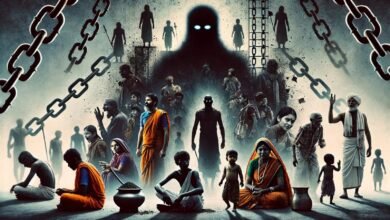Policies damaging educational standards in government schools
By Doruvu Paul Jagan Babu:Bureau Chief

Samata Sainik Dal has raised serious concerns about the Central and State Governments’ educational policies, accusing them of undermining the educational working days in government schools. The organization alleges that these policies are harming the future of students, particularly those from marginalized communities.

Impact of government decisions on education
Education, being in the common list, places the responsibility on both Central and State Governments to shape the future of students in government schools. While there is broad agreement on the need to provide basic facilities, Samata Sainik Dal argues that the current policies aimed at improving educational standards are instead causing significant harm to educational development.
ASER Report 2023 highlights declining educational standards
The ASER Report 2023 offers a stark evaluation of the current educational situation, indicating a decline in standards:
Literacy struggles: The report reveals that 25% of youth aged 14-18 struggle to read their second language without errors. Additionally, despite widespread smartphone access, about 25% of rural youth can’t read grade 2-level textbooks in their regional language without mistakes.
Mathematical challenges: More than half of the students struggle with basic arithmetic, with only 43.3% able to solve simple division problems correctly—a skill expected of third and fourth graders.
English proficiency: Only 57.3% of students can read sentences in English, reflecting a significant gap in language education.
The ASER report underscores the deterioration of educational standards, contradicting the government’s claims of progress. The full form of ASER is Annual Status of Education Report. It is a survey that provides insights into the basic learning outcomes of children in India, primarily in rural areas. The report is produced by the non-governmental organization Pratham and is widely regarded as a key indicator of the state of education in the country.
Programs damaging school working days
The frequent disruption of school working days due to government programs and policies. Several initiatives, such as the Vidya Pradesh 90-day program, Swachhata Pakhwada 15-day program, and Shiksha Week, which collectively reduce the number of effective teaching days. With only 202 school days in a year, more than half are adversely affected, leading to diminished academic outcomes.
Concerns over government’s approach to education
SSD points out that IAS officers and other senior officials, who manage the education departments, often send their children to corporate schools. They argue that these officials fail to understand the negative impact of their policies on government school students. SSD suggests that any new educational scheme should first be implemented in corporate schools before being introduced in government institutions.
Concerns over CBSE and self-assessment
The introduction of the CBSE system in selected schools has also come under scrutiny. In mock tests for the Class 10 entrance exam, only 46% of students passed all subjects, raising concerns about the upcoming official exams.
The Andhra Pradesh government’s shift to self-assessment tests has further drawn criticism, with Samata Sainik Dal stating that these tests take 7-8 days to complete, further reducing valuable instructional time.
Call for accountability and improved planning
Samata Sainik Dal demands that the government develop an education plan that ensures 202 uninterrupted working days, allowing teachers to focus on teaching. They stress that the current approach disproportionately harms students from SC, ST, BC, and minority communities, further exacerbating educational inequality.

Tribute to educational pioneers
On the occasion of Teacher’s Day, Samata Sainik Dal pays tribute to educational pioneers like Kranti Jyoti Amma Savitribai Phule, Sheikh Fatima, and Dr. Babasaheb Ambedkar, who championed the right to education for all, particularly the underprivileged. The organization calls for a renewed commitment to protecting and advancing educational opportunities for all students in government schools.
Views expressed in the article are those of Bethala Sudarshanam, AP State President, Samata Sainik Dal.








